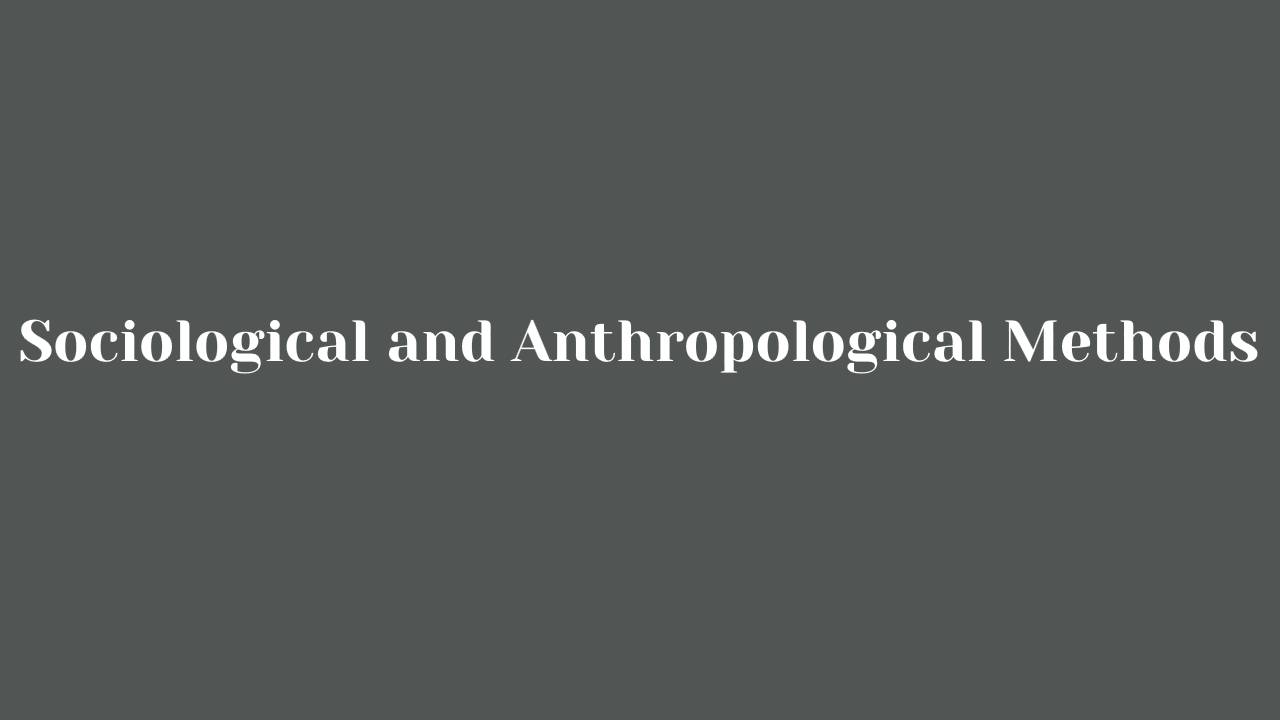Sociological and Anthropological Methods

Sociological research is a system of coherent methodological, methodical, organizational and technical procedures that involves obtaining accurate data and facts about the phenomenon or processes. The methods of sociological research are divided into methods of collecting information (the method of document analysis, the method of observation, the method of survey, and experimental method) and methods of analysis of the material (the use of statistical groupings, identifying of quantitative relationships and so on).
The method of analysis of documents provides data about events, observing of which are impossible. The study of documents often brings out the trends and dynamics of change and development. There are two types of methods of analysis of documents: the traditional content analysis, which is actively used in studies of media being the independent formalized method of grouping of texts, and biographical method, which is centered on the study of an individual life path. The observed information can be in various forms: photographs, books, journals, or government records. However, this method faces the following disadvantage: observed data may be unsuited or even flawed. It can provoke unsuitability of the whole research.
The method of survey takes 90% of all methods of data collection. Survey is a method of gathering social information about an object in the course of direct (interview) or indirect (questionnaire) socio-psychological communication of sociologist (interviewer) and the one, who is being questioned (respondent) by registering the responses.
Survey methods are divided into interview and questionnaire. Interview is a conversation conducted on a definite plan. It provides direct contact between an interviewer and respondent. The form of its conduct can be direct and indirect (e.g. by telephone).
Peculiarity of the questionnaire survey is the use of questionnaires filled out by the respondent. The respondent reads and records the questionnaire responses. The questionnaire survey can be ocular (the interviewer hands out questionnaires and is present while the respondent is completing them) and distant, which in turn can be mailed (questionnaires are sent by mail and after a while returned to the researchers), pressing (questionnaires are published in newspapers or magazines) and telephone (survey takes place over the phone).
The disadvantage of this method deals with the fact that the received information can be unreliable. Moreover, surveyors can refuse to answer some questions. It will provide inaccurate or incomplete results of the survey.
However, the method of survey has its philosophical justification. It is considered to be the best method of gathering information quickly. Moreover, the survey gives the chance for the subjects of the research to remain anonymous. This method is very good for statistical research or research that requires learning about large amount of information. William Haviland, Harald Prins, Bunny McBride, and Dana Walrath (2013) state that “anthropology is the study of humankind in all times and places”.
Cultural anthropology is the study of culture as a set of material objects, ideas, values, attitudes and behaviors in all forms of its manifestation and all historical stages of development. In a simplified sense, cultural anthropology studies human behavior and results of its activities.
One of the methods of cultural anthropology is study of life history. The use of this method consists in the fact that a researcher is able to receive a general picture of a person’s life and analyze this person’s experience. By collecting information about life history, the researcher may gain deeper understanding of the studied culture. Documentation of life history is useful for better understanding a group of people. Study of life history is important in researching another culture or way of living.
Ethnology is another method of cultural anthropology. An anthropological researcher needs to participate in the studied culture as well as to observe it. The researcher has to live within the community, which culture is studied, and receive first-hand information by participating or witnessing its everyday life. Information is recorded for deeper understanding of the culture. A deep immersion into the culture gives an opportunity to learn more about it by communicating with people of this culture. It results in deeper relationships between the researcher and the observed population. Therefore, people may open up more information, allowing to understand and see all spheres of their culture. However, this method is not ideal. Observed people can change their behavior as they know that the researcher studies them.
Despite considering ethnology as an invasion of people’s privacy, anthropologists are ethically obligated to get permission from the community before studying its culture, and respect all wishes of the people. The philosophical justification for this method is that by immersing in the culture for a long period of time, the anthropologist learns more and people begin to trust the researcher. It makes the received information accurate and comprehensive. Significance of ethnography consists in the learning and interacting with the culture. It also provides a historical record of endangered or extinct cultures.
The difference between sociological and anthropological research methods cannot be seen. Both studies gather information using similar methods, but reporting and utilizing of the information is different. Despite using similar forms of research, the studies have different purposes. The cultural anthropology is trying to understand the culture, while sociology is oriented on the understanding of the human as social creature.
References
Haviland, W., Prins, H., McBride, B., & Walrath, D. (2013). Cultural anthropology: the human challenge. Cengage Learning.